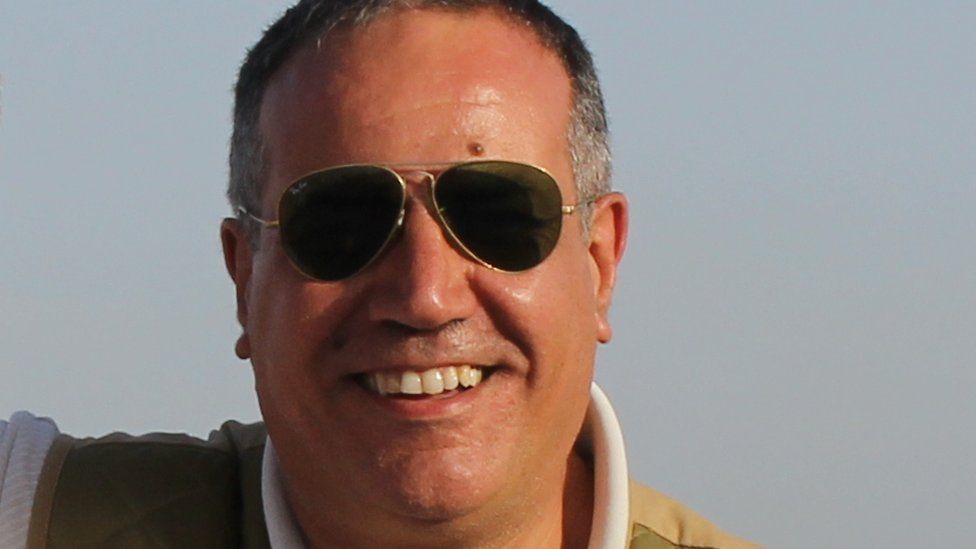Algeria's Said Chitour - spy or journalist?
- Published

The family of Algerian journalist Said Chitour has been desperately trying to secure his release since he was arrested on espionage charges after visiting Spain, writes the BBC's Lucy Ash.
When I worked with Chitour, what I remember most is his throaty laugh.
His warmth and sense of humour helped to put interviewees at ease whether they were officials, imams, young entrepreneurs or fishermen.
His passion for the extraordinarily varied landscape of the North African state was infectious.
I was also struck by his deep knowledge of history.
'The black decade'
Two years ago he helped British historian Mary Beard and her crew to film the city of Timgad, founded in 100 AD by the Emperor Trajan for her BBC TV series Ultimate Rome.
"I have very fond memories of Said Chitour," she says. "He was wonderfully efficient, good humoured, sensible in guiding us through all the pleasures and complexities of filming in Algeria."
When I was on assignment in Algiers, Chitour took me through the tangled alleyways of the kasbah. He knew the story behind almost every building.
Chitour, aged 54, who has eight brothers and sisters, was originally a specialist tour guide.
Then in the 1990s he began working as a fixer and field producer for journalists.
That is when the military-backed government cancelled elections the Islamist Salvation Front was poised to win, unleashing a civil war that claimed at least 150,000 lives.
During the period Algerians refer to as "the black decade", it was very dangerous to travel around and speak to people but somehow he managed it.
'Energy and integrity'
In a recent appeal to Algerian President Abdelaziz Bouteflika to release him, Said's mother Luisa stressed that many well-qualified people chose to emigrate at that time, including some of her other children. But Chitour refused to go.
"He fought with his pen, and all his energy for the image, integrity and good of Algeria," she wrote.
Chitour has worked with many of my colleagues at the BBC as well as news organisations and documentary film crews from other countries including France and the United States.
On 5 June, as Chitour was returning from a trip to Spain, he was arrested by the intelligence services and taken to El Harrach, the main prison in Algiers.
He is accused of giving sensitive information about Algeria to foreign officials, a charge he denies.
His legal team has said he did not have access to confidential material and had not given anything to foreign diplomats.
The government has not responded to my repeated requests for comment on Chitour's arrest.
'National security threat'
With his lawyers, he has attended a series of court hearings, most recently at the end of September, but no trial date has yet been set.
"As far as we can tell," said Miloud Brahimi, one of his lawyers, "there is nothing incriminating in Chitour's file."
The investigating magistrate is now expected to make an assessment of the severity of his alleged offence, after which a decision will be made as to the appropriate tribunal for the trial.
If he is found guilty of Article 65 in the penal code, handing over documents that damage national security or the economy, Chitour could face up to 25 years behind bars.
The campaign group Reporters Without Borders said it was "appalled" by the way he has been treated and has called for his immediate release.
Algeria is ranked 134th out of 180 countries on Reporters Without Border's press freedom index.
'Deeply traumatised'
Earlier this year the organisation warned that the North African state used "harassment" and "threats" to pressure journalists.
The US-based Committee to Protect Journalists said in July that Chitour's arrest "appears to be an attempt to keep information about Algeria out of the international press".
Speaking from her home in Canada, Chitour's sister Alilou Alia said that she had flown to Algiers to visit her incarcerated brother in August.
"He had lost so much weight in prison he was unrecognisable," she said. "He is a diabetic and we are all desperately worried for him."
In her letter to the president, Chitour's mother said that her son's three children and his wife Soumia, a surgeon in the emergency department of a local hospital, were deeply traumatised by his continued detention.
"It is only you, and God the all-powerful, who can take us out of this nightmare that kills me, my children and my grandchildren," she wrote. "May the peace you have succeeded in bringing back to our country, return to our home."
- Published29 August 2023
- Published20 August 2015